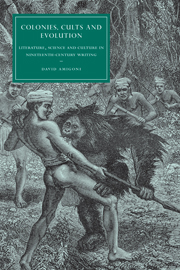Book contents
- Frontmatter
- Contents
- Acknowledgements
- Introduction: literature, science and the hothouse of culture
- 1 ‘Symbolical of more important things’: writing science, religion and colonialism in Coleridge's ‘culture’
- 2 ‘Our origin, what matters it?’: Wordsworth's excursive portmanteau of culture
- 3 Charles Darwin's entanglements with stray colonists: cultivation and the species question
- 4 ‘In one another's being mingle’: biology and the dissemination of ‘culture’ after 1859
- 5 Samuel Butler's symbolic offensives: colonies and mechanical devices in the margins of evolutionary writing
- 6 Edmund Gosse's cultural evolution: sympathetic magic, imitation and contagious literature
- Conclusion: culture's field, culture's vital robe
- Notes
- Bibliography
- Index
- CAMBRIDGE STUDIES IN NINETEENTH-CENTURY LITERATURE AND CULTURE
2 - ‘Our origin, what matters it?’: Wordsworth's excursive portmanteau of culture
Published online by Cambridge University Press: 22 September 2009
- Frontmatter
- Contents
- Acknowledgements
- Introduction: literature, science and the hothouse of culture
- 1 ‘Symbolical of more important things’: writing science, religion and colonialism in Coleridge's ‘culture’
- 2 ‘Our origin, what matters it?’: Wordsworth's excursive portmanteau of culture
- 3 Charles Darwin's entanglements with stray colonists: cultivation and the species question
- 4 ‘In one another's being mingle’: biology and the dissemination of ‘culture’ after 1859
- 5 Samuel Butler's symbolic offensives: colonies and mechanical devices in the margins of evolutionary writing
- 6 Edmund Gosse's cultural evolution: sympathetic magic, imitation and contagious literature
- Conclusion: culture's field, culture's vital robe
- Notes
- Bibliography
- Index
- CAMBRIDGE STUDIES IN NINETEENTH-CENTURY LITERATURE AND CULTURE
Summary
WORDSWORTH AND SCIENCE, CHARLES DARWIN'S POETICAL ‘BOAST’
When J. A. Symonds wrote his essay on ‘Culture: Its Meaning and Uses’ in 1893, he offered a riposte to a reviewer who sneered at the man of letters apparently ‘travelling round Europe with a portmanteau full of culture on my back’. Staggering under the burdensome knowledge of the arts, crafts, sciences, literature, and manners and mores of other places, as though such knowledge were a ‘pedlar's pack’, was, for Symonds, a misconception of ‘culture’. Yet William Wordsworth's The Excursion (1814) dramatised ‘culture’ in precisely this manner, as though knowledge and the affective power that builds sympathy were the contents of a pedlar's pack, carried between geographical regions by the migrant figure, the Wanderer at the centre of the poem. Wordsworth's poem itself ‘transports’ knowledge through a range of lengthy endnotes reflecting variously on peddling and colonisation; travelling and self-cultivation; religious sentiments concerning death and epitaphs as markers of immortality and ‘sympathy’; and education as a mode of ‘simple engineering’. When combined with the poetry, this knowledge produced, I argue, an unstable discursive mix, an instability that Wordsworth was alert to in his unpublished reflections on language as ‘counter-spirit’, or another version of that supplementarity that would mark the practice of the ‘literary’ following encounters with discourses of science. For Wordsworth's writing was a compelling mix for those who were beginning to fashion science as an important source of mental culture.
- Type
- Chapter
- Information
- Colonies, Cults and EvolutionLiterature, Science and Culture in Nineteenth-Century Writing, pp. 57 - 83Publisher: Cambridge University PressPrint publication year: 2007



